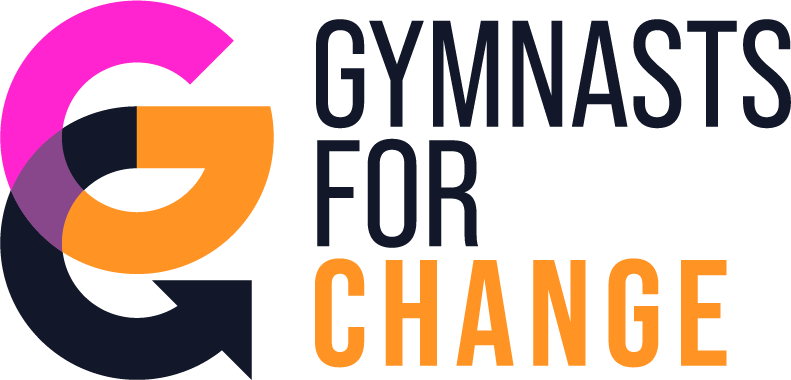A Call for Change: Taking the First Steps
PART ONE
Gymnasts for Change asked a panel of experts from across the world what key change they’d like to see – to the culture, competition format or code – to make gymnastics a safer sport for all. Here’s what Jennifer Pinches, Georgia Cervin and Adeline Hawkes had to say.
The release of Athlete A on Netflix in mid 2020 triggered a landmark moment in the history of gymnastics. The film laid bare the ‘win at all costs’ business model operated by USA gymnastics, in which advertising revenue and business partnerships have been consistently prioritised over athlete welfare and child protection. Using the hashtag #GymnastAlliance, hundreds of gymnasts from around the world responded, to reveal that the story is not so different elsewhere.
Here in the UK, while reports of sexual abuse are known to be taken seriously by our governing body, when it comes to physical assaults and emotional abuse we still have a long way to go. Many in the gymnastics world know it’s time for change, but where to begin?
Gymnasts for Change asked a panel of experts from across the world what key change they’d most like to see – to the culture, competition format or code – to make gymnastics a safer sport for all. Here’s what Jennifer Pinches, Georgia Cervin, and Adeline Hawkes had to say..
Jennifer Pinches
London 2012 Olympian and #GymnastAlliance founder
For far too long there have been dangerous flaws in Gymnastics’ shared system of beliefs and behaviors. Certain approaches have become normalised, despite having significantly detrimental effects on athletes’ physical and mental wellbeing. Whether through cruelty or naivety at just how widespread and damaging this culture has been, Gymnastics has largely turned a blind eye to those who have raised the alarm. Until now.
This year’s media coverage has been instrumental in calling attention to the serious issues woven into certain parts of this sport, and raising awareness of the need for change worldwide. Acknowledging any problem is the first step to solving it, so this has been essential.
Now, what next? The doors are open and the real hard work begins. Together we must re-evaluate the status quo in every area relating to gymnastics training, and introduce new methods, where they can help ensure gymnastics is a truly safe sport for all. It won’t be easy but it will be worth it.
If there were one key change I could implement right now, it would be to make an independent body for athlete welfare available for all gymnasts, in every country. I think it’s essential for systems of accountability to be free from any conflicts of interest, or there will always be the risk of corruption for the sake of medals and money.
Georgia Cervin
Honorary research fellow, University of Western Australia and member of the International Socio-Cultural research group on Women’s Artistic Gymnastics (ISCWAG)
One thing I am incredibly concerned about is the lack of monitoring and reporting that happens regarding abuse in sport - when you compare to say, drug testing. There should be national and international equivalents who come into gyms to make sure everything is ok and sanction coaches, clubs and countries if they're not. Anti-doping provides a great infrastructure model but it's not being used for preventing abuse in sport.
Perhaps there should be an equivalent system to WADA, but instead of looking for doping it looks for abuse. It could operate nationally, but also internationally, and have the ability to sanction at the coach/club or even national level when proper welfare standards are not being enforced. It could also operate like WADA in terms of being both an independent whistleblowing system for reporting wrongdoing, and a proactive monitoring system that carries out random spot checks, as well as planned checks- with observations and screening questions.
Doping is an abuse of trust and attack on the fairness required by sport as well as being potentially unsafe for an individual's physical and mental health. Unethical coaching is the same, and should be treated as such.
Adeline Hawkes
Teacher & Level 2 gymnastics coach
I have been involved in gymnastics for 40 years. For some of this time I was lucky to be coached by my Dad - who has always had a uniquely positive approach to coaching. However over the years I have seen a wide range of coaching styles, not all of them as positive as my father’s style of mentorship.
For the past 30 years I have worked as a level 2 General Gymnastics coach as well as a secondary school teacher. And what working as a qualified teacher has shown me is that we don’t seem to safeguard children in the gym in the same way we do in a school. In education we strictly adhere to the ‘Keeping Children Safe in Education’ statutory guidance, which clearly lays out how children should be safeguarded and protected. It seems logical that gym clubs should also be bound by the same standards as schools.
As a teacher I am held accountable for every interaction I have with a child and yet in the gym, children may not experience the same level of accountability. Many of our gymnasts at elite level spend almost more hours in the gym than they do at school, and should therefore experience the same level of safeguarding and protection as they would at school.
British Gymnastics should be encouraged to adopt the principles laid out in the Keeping Children Safe In Education guidance to ensure that gymnasts of all ages can participate in the sport they love in an environment that nurtures and values them at all times.

